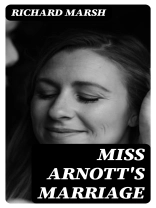In ‘Miss Arnott’s Marriage, ‘ Richard Marsh skillfully intertwines romance with social commentary, exploring the constraints of Edwardian society and the expectations placed upon women in matrimony. Through the eyes of the clever and spirited protagonist, Miss Laura Arnott, readers are drawn into a narrative that deftly balances wit and depth, revealing the intricate interplay of desire, duty, and societal norms. Marsh’s prose is both elegantly crafted and accessible, reflecting the era’s prevailing literary styles while offering a sharp critique of the matrimonial institution. Richard Marsh, an influential figure in early 20th-century literature, was known for his keen insights into human psychology and the complexities of social relationships. His diverse background—including experiences in law and travel—imbued him with a unique perspective, often reflected in his characters’ moral dilemmas and emotional struggles. ‘Miss Arnott’s Marriage’ emerges from a rich tapestry of personal and cultural influences of the time, providing a window into the shifting dynamics that defined gender roles and marriage. This novel is a compelling read for those intrigued by historical fiction that resonates with contemporary themes of self-discovery and autonomy. Marsh’s engaging narrative invites readers to reflect on their own perceptions of love, partnership, and the societal constructs that influence personal choices. A must-read for fans of literary exploration and social critique.
Mengenai Pengarang
Richard Marsh, born Richard Bernard Heldmann (1857–1915), was a prolific British author best known for his supernatural and horror fiction. He began his writing career as a contributor to boys’ journals and magazines under his birth name before adopting his pseudonym with the release of his acclaimed novel ‘The Beetle’ (1897), which overshadowed even Bram Stoker’s ‘Dracula’ in its initial popularity. While ‘The Beetle’ remains his most famous work, Marsh wrote numerous other novels, short stories, and dramas that solidified his reputation as a master of suspense and the uncanny. ‘Miss Arnott’s Marriage’ is a testament to Marsh’s versatility, showcasing his ability to pivot from the genres of gothic horror to domestic romance and social commentary. His literary style is characterized by a blend of intrigue, melodrama, and wit, often exploring themes of identity, the supernatural, and Victorian society. Marsh’s works illustrate an ability to capture the anxieties of his time while also entertaining a diverse audience. Today, scholars and enthusiasts of Victorian literature continue to study his contributions to the period’s genre fiction, and his stories remain a valuable part of the literary canon reflecting the era’s peculiar fascinations.












